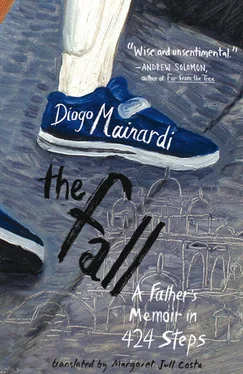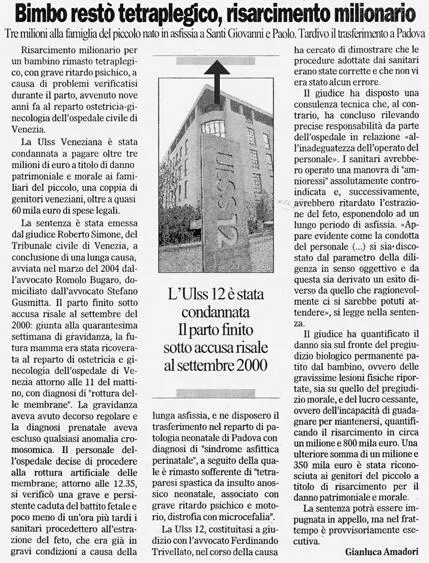
352
In the previous image: the report in Il Gazzetino about Tito versus Venice Hospital.
Headline: “Child left quadriplegic receives millions in compensation.”
353
Il Gazzetino reported that the civil court had ruled that the Hospital Santi Giovanni e Paolo should pay more than 3,000,000 euros in compensation to a child born in September 2000.
They also reported that the court had accepted all the arguments presented by the lawyer Romolo Bugaro, highlighting “improper conduct by the medical staff,” “an entirely unnecessary amniotomy” and “a delay in removing the fetus.”
354
Antonio, William Shakespeare’s merchant, frees himself of his debt to Shylock, the Jewish moneylender, because he is represented in the Venice courts by Portia, a rich heiress disguised as a lawyer from Padua.
I freed myself from my debt to Tito because I was represented in the Venice courts by Romolo Bugaro, a novelist disguised as a lawyer from Padua.
355
During the first ten years of his life, Tito cost me 3,497,916 eggs.
From that day on, he began to produce his own eggs, like Neil Young’s son on his farm.
356
In the last volume of In Search of Lost Time , the Narrator is filled with a sense of happiness because the memory of his walks over the uneven paving stones of Venice renders him “unalarmed by the vicissitudes of the future” and indifferent to “the word ‘death.’ ”
On the walk back from the Fondamenta delle Zattere, after receiving Romolo Bugaro’s phone call, I too was filled with a sense of happiness. From one moment to the next, Tito’s future had ceased to depend upon me. I was free to die.
357
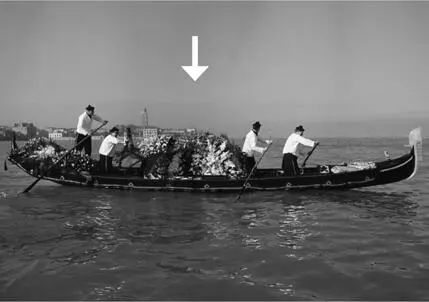
(Picture Credit 1.20)
358
In the previous image: Ezra Pound’s funeral in Venice.
359
In 1945, Ezra Pound was arrested and charged with treason for his radio broadcasts about Jewish parasites.
After twelve years in St. Elizabeth’s Hospital in Washington, he was released and moved back to Venice, where he remained until his death.
I spent less time in Rio de Janeiro than Ezra Pound spent in St. Elizabeth’s.
After only eight years, I began to think about going back to Venice and remaining there until my death.
360
Tito was fine in Rio de Janeiro. Nico was fine in Rio de Janeiro. Anna was fine in Rio de Janeiro. I was fine in Rio de Janeiro.
However, just as we always started counting from zero again whenever Tito stumbled and had to stop walking, Anna and I needed to go back to Venice and take up our lives where they had left off.
361
I’m looking now at the photos of our last months in Rio de Janeiro.
Tito celebrating his birthday in a barbecue restaurant. Nico playing football at the Flamengo football school. Tito with his walker, following a carnival troupe. Nico spotting a whale from the window of our apartment. Tito on his way to school on his tricycle. Nico watching the removal of a corpse from the trunk of a car.
We were fine in Rio de Janeiro. We were ready to leave.
362
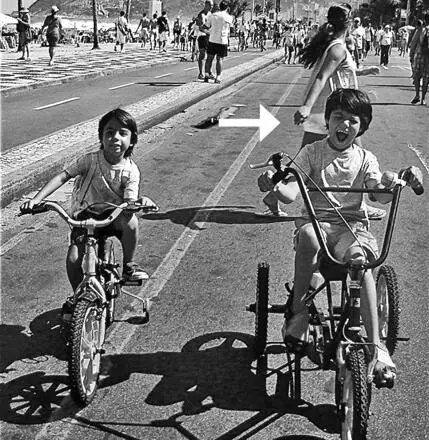
363
In the previous image: Tito on his tricycle.
The tricycle was Tito’s fourth mode of transport.
364
We disembarked in Venice on 4 August 2010.
365
Mark Twain disembarked in Venice on 20 July 1867.
He wrote:
What a funny old city this Queen of the Adriatic is!
… If you want to go to church, to the theatre, or to the restaurant, you must call a gondola. It must be a paradise for cripples, for verily a man has no use for legs here .
366
Venice was a paradise for my cripple.
For the first time, Tito could move around freely, by vaporetto.
Contrary to Mark Twain, he also used his legs.
Accompanied only by someone we hired to help him up and down the bridges, Tito went for daily four-hour walks with his walker, passing churches, theatres and restaurants.
367
According to Mark Twain, Venice by night seemed “crowned once more with the grandeur that was hers five hundred years ago.” In the shadows, it was easy to imagine the city with its Desdemonas and its Shylocks, with its “plumed gallants and fair ladies,” with its “noble fleets and victorious legions returning from the wars.”
By day, though, Venice showed only signs of its fall from power. Mark Twain described it as “decayed, forlorn, poverty-stricken, and commerceless — forgotten and utterly insignificant.” In the glare of day, the Queen of the Adriatic looked like “an overflowed Arkansas town.”
368
Tito walked through Venice exactly as if he were walking through an overflowed Arkansas town, oblivious to Venice’s glory or its fall from power. What mattered to him was being able to walk alone. Paradise was a place in which Tito could walk without my help.
369
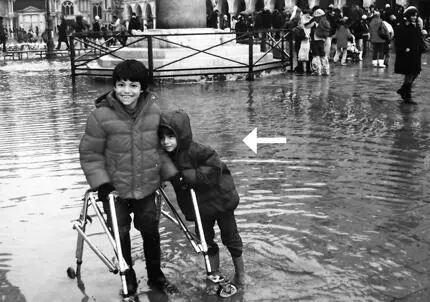
370
In the previous image: Tito and Nico during a flood in Venice.
371
Christopher Nolan had cerebral palsy.
He published his memoir, Under the Eye of the Clock , when he was only twenty-two years old.
When his book won a prize, he remarked: “You all must realize that history is now in the making. Crippled man has taken his place on the world’s literary stage.”
372
I was also working on a memoir about Tito.
My plan was to end the memoir with the story of an ascent of Mount Everest, which Tito would conquer three hundred and fifty-nine steps at a time.
My crippled man would take his place on the world’s stage. History in the making.
373
Christopher Nolan was born mute.
During his early years, he could communicate only by looking up. When he did that, his parents knew that he was saying “Yes.”
That’s right: all he could say was “Yes.”
374
When he was eleven, Christopher Nolan’s father strapped a “unicorn stick” to his head.
From that moment on, Christopher Nolan began to communicate in writing, tapping with the stick on the keyboard of a typewriter.
375
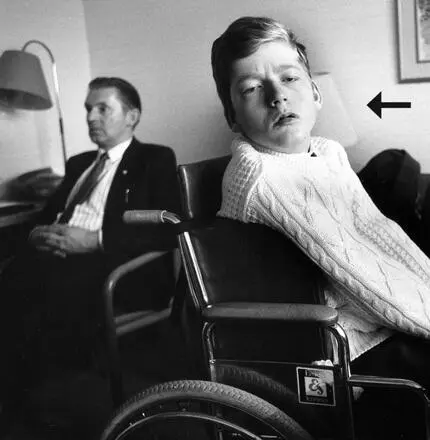
(Picture Credit 1.21)
376
In the previous image: Christopher Nolan and his father, Joseph Nolan.
377
In his memoir, Christopher Nolan described how the other boys at Mount Temple School in Dublin saw him.
They called him “weirdo,” “eejit” and “mental defective.” They wondered “if the cripple wore a nappy.” They discussed his “lack of intelligence.” They decided he shouldn’t be in a normal school.
378
Christopher Nolan’s isolation at Mount Temple School inspired R.E.M. to write a shamelessly sentimental song, asking: Why the other kids were always looking at him? Why did they laugh at him? What could he say? What could he do?
Читать дальше
